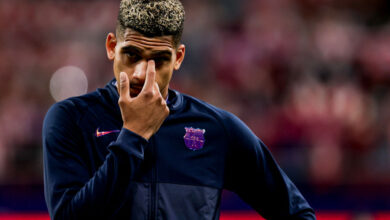Why Kevin De Bruyne’s Equaliser At Real Madrid Should Not Have Stood

Kevin De Bruyne was fortunate that his stunning equaliser for Manchester City in their 1-1 draw at Real Madrid stood as new images suggest the hosts should have had a throw-in during the previous phase of play.
Los Blancos weathered an early City storm and went a goal up in the first leg of their Champions League semi-final via a sensational strike from Vinicius Junior.
Similarly against the run of play, Pep Guardiola’s side found the back of the net midway through the second half, with De Bruyne scoring an almost identical goal to Vinicius’.
However, Real Madrid had protested that in the half-minute or so leading up to the leveller, the ball had gone out of play, with Bernardo Silva adjudged to have just about kept the ball in play on the touchline.
The phase of play ended with De Bruyne having a cross blocked, though Man City won possession back almost immediately, quickly leading to the Belgian’s equaliser.
Real Madrid protested the decision not to award a throw-in prior to the goal and they were further incensed after, with Carlo Ancelotti picking up a booking for his protests.
During a post-match show on beIN Sports, a 3D computer-generated image – similar to those used for goal-line technology – revealed that the ball had indeed gone out of play.
Speaking in his post-match press conference, a furious Ancelotti said: “It was out. It’s not just me saying it, it’s technology saying it. I think it’s strange. I don’t understand why they did not use VAR.”
It is unusual but not without precedent for VAR to intervene with such an incident – Real Madrid famously had a goal against them allowed during their 4-1 defeat at home to Ajax in 2019 when pictures proved inconclusive as to whether the ball had left the pitch in the lead-up to the visitors’ third of the evening.
But ultimately, De Bruyne’s strike came from a new phase of play, meaning it was beyond VAR’s jurisdiction anyway.



